by citisven
Fri Aug 27, 2010 at 02:40:37 PM PDT
Whenever I travel to different countries and cities, one of the things I’m interested in is how locals move around in their daily lives. Call me a transportation glutton, but I’m a sucker for trains, boats, rickshaws, trams, buses, gondolas, back alleys, and sidewalks.
Then, of course, there’s the most sublime transit invention of them all: the bicycle. It’s so simple — even a non-techie like myself understands how it works — and yet so deliciously useful, relieving traffic, getting you anywhere quickly, reducing CO2, keeping you in shape, letting you see a place and interact with its people.
One thing I noticed on my trip to Italy a few months ago was how much bikes were part of everyday life. With David Byrne’s Bicycle Diaries as my companion I strolled through the streets of cities and towns, trying to capture the mundane beauty of cycling.

- citisven’s diary :: ::
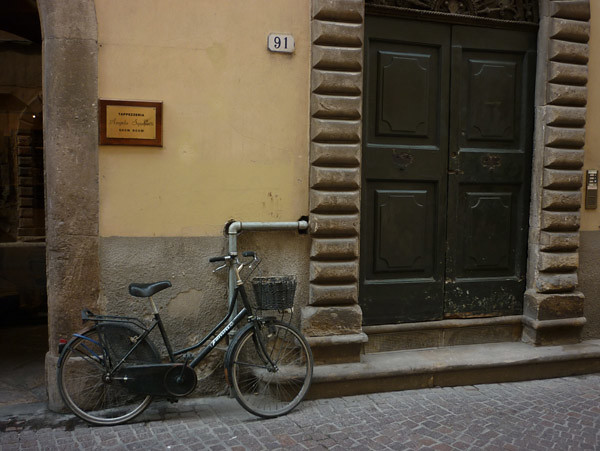
One of the biggest stumbling blocks in changing the ways we move around, eat, or do business, is the common perception that living a less fossil fueled life means sacrifice and inconvenience, even drudgery. In the case of the bicycle, the danger factor is often added to the list of reasons of why it would be such a bad idea to get out of our cars.
But aren’t the 5000 pound metal boxes we use to schlep ourselves around in the very reason bicycling is so dangerous? What if there were more bikes than cars in the streets?
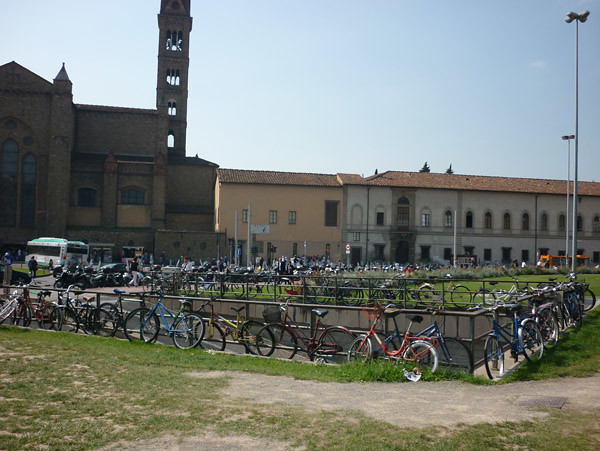
And what if the cars that were left to do the heavy lifting were much smaller, on eye level with bikes?

It’s hard to imagine from an American perspective that cycling could be so safe you don’t even have to wear a helmet. Understandably so, but it really shows how much cars have not only occupied our physical but mental space.
David Byrne makes an interesting observation:
I personally sense that helmets might be an interim step toward integrated urban biking. Although they might always be a good idea, the wearing of helmets implies that cycling is dangerous, which at present it often is in cities like New York and London. But in other cities like Amsterdam, Copenhagen, Berlin and Reggio Emilia in Italy, the bike paths and lanes are so safe that the riders don’t feel the need to protect themselves. Cyclists in these places — kids, young creative types, businesspeople, seniors — also tend to ride upright with an elegant bearing; they’re well dressed, and even sexy. It’s a different attitude than the New York City head-down-into-battle approach.
That guy is looking like he’s having a pretty nice commute…
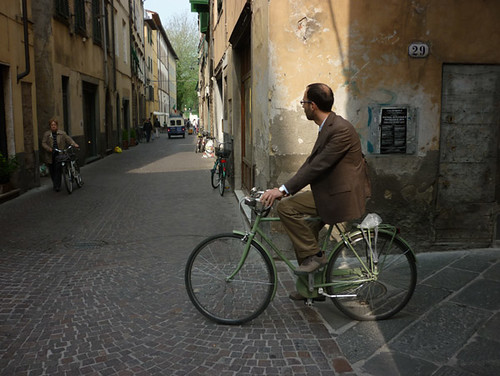
And just because it’s safe to ride your bike doesn’t mean you can’t have a busy life and start your work day during your commute…
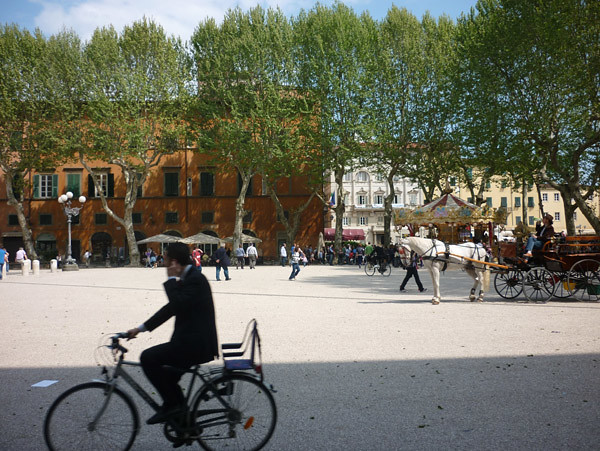
As David continues:
Maybe, for some, part of the thrill would go away if urban cycling became safe. But that might be the price to pay if it means more people will start using bikes to get around. That thrill isn’t really an appropriate thing to oblige schoolkids and seniors to be burdened with. Living in New York used to be a lot more dangerous in general, but that’s hardly something to get nostalgic about. So, while we might need a cool, stylish helmet to be available right now, for everyone in a more perfect world it might be optional.
I think this really cuts to the heart of it. While it’s still far from being a reality in U.S. cities and towns, in a post-carbon world the bicycle won’t need to be an environmental, political or fashion statement. You can make the same case for everything from solar panels to urban gardens to pedestrian zones. If biking is just part of our daily routine it can’t be marginalized and politicized as a boutique hipster activity, another “green” fad. And you know you have a bicycle culture when your elders are leading the way…
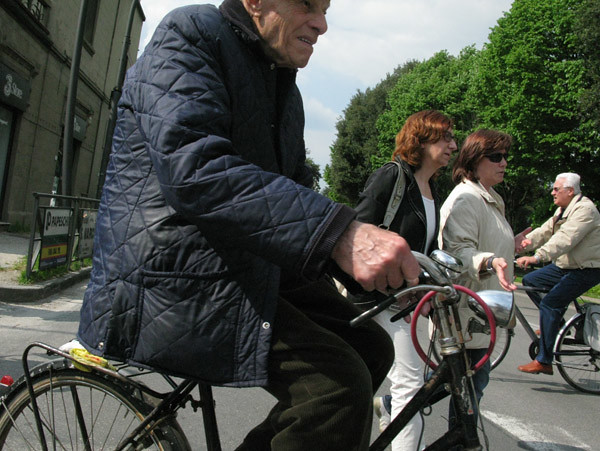
…looking dapper
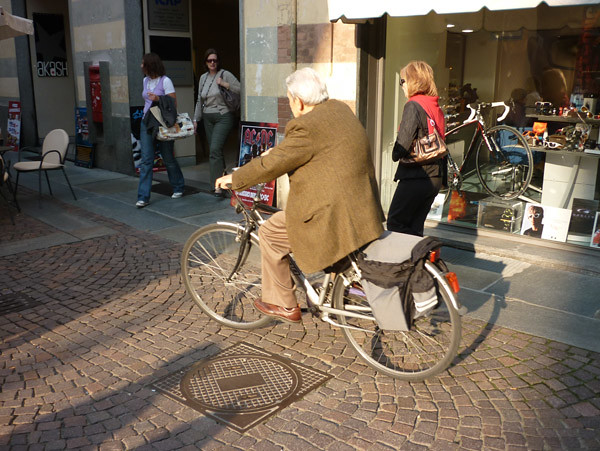
…running errands
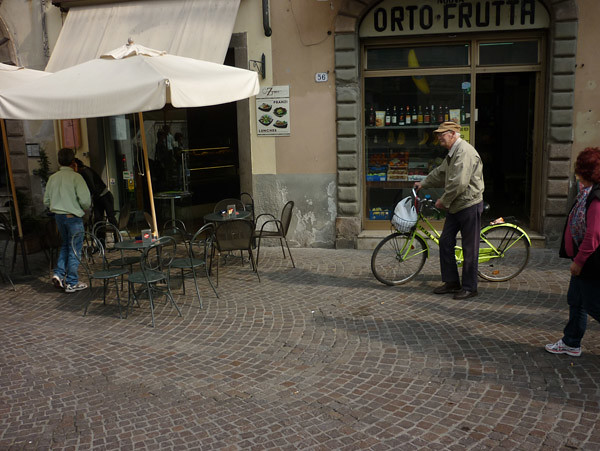
And speaking of running errands, doing it on a bicycle is only a drag if your infrastructure is completely skewed in favor of cars, and you’re forced to traverse high traffic roads, breathe exhaust, and don’t have any social interaction. Within that trajectory it’s understandable how cycling would be considered a chore, a step backwards, a joyless sacrifice you only do because you want to do something good for the earth.
See how easily doing something good for the earth gets equated with drudgery? That’s how the clever marketeers of cars and oil and big air-conditioned shopping malls like it. As long as we’re stuck in their paradigm of what’s normal, bicycling and so many other natural ways of living together will continue to be cute but marginalized “only for some” leisure activities.
Does this look like drudgery?
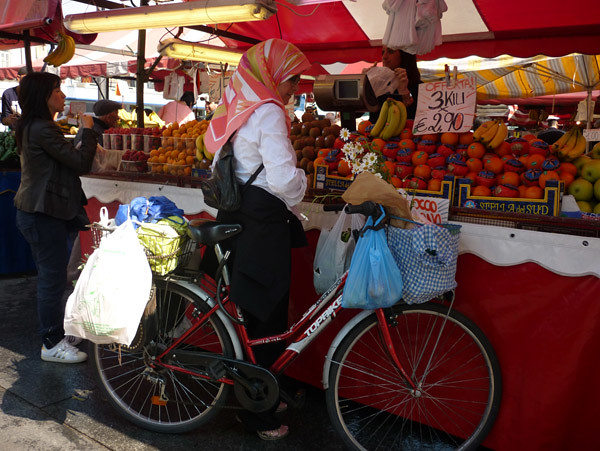
I don’t know about you, but to me the idea of riding a bike to the market and chatting with the farmers about which fruits and vegetables are in season is a lot more appealing than parking my car in a big concrete lot and then wandering through the aisles of a neon-lit supermarket in search for food that I don’t know where it came from and how it got there.
Somehow we’ve come to believe that more technology always equals more progress, that the more metal, concrete, middlemen, and terrabytes we can get between us the more advanced, independent and emancipated we get. In turn, we’ve developed an innate suspicion of simplicity as something arcane and dreadful, leaving us permanently dissatisfied with where we are and what we have, yearning for new and ever more complicated ways to get to where we imagine ourselves wanting to be, without ever arriving.
And isn’t what we humans ultimately still want the most — no matter how much stuff we own or how many miles we drive — to be connected, understood, treated with love and respect, and live a dignified life?
David quotes Enrique Peñalosa, former mayor of Bogotá (Colombia) who revolutionized the transportation and parks movement in that city:
Transportation is not an end — it is a means to having a better life, a more enjoyable life — the real goal is not to improve transportation but to improve the quality of life.
snip
All this pedestrian infrastructure shows respect for human dignity. We’re telling people, “You are important — not because you’re rich or because you have a Ph.D., but because you are human.” If people are treated as special, as sacred even, they behave that way. This creates a different kind of society.
Looking at the comfort and ease with which these Italians ride their bikes makes me think that perhaps our own propensity to create “convenience” by adding ever more invisible layers of complexity is like a road to nowhere that we need to get off of…
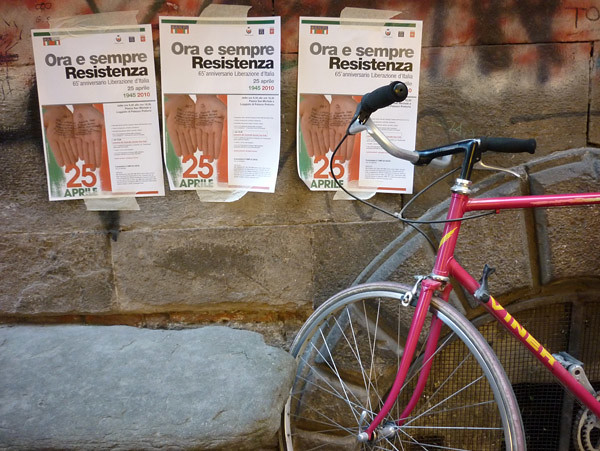
or pedal in another direction…
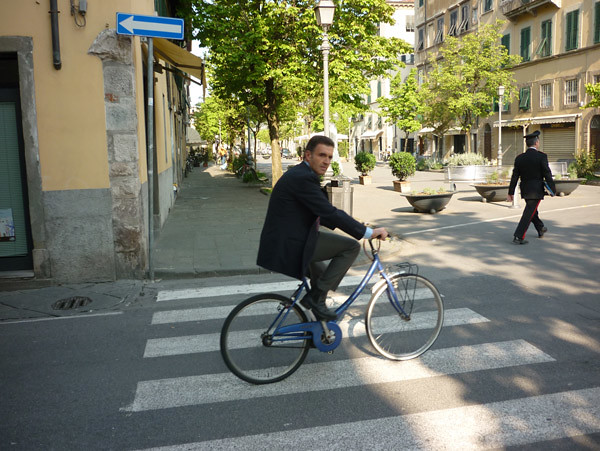
One of the ostensible paradoxes inherent in the realities of peak oil and climate change is that we have to take action while at the same time slowing our pace. Yes, there has to be drastic change politically and economically, but how can we possibly implement and live those changes if speed and consumption are branded in our minds as the vehicles to get us there?
I think we have to understand that the challenges we face will not be met by politics and technology alone. In order to change the infrastructure of our cities and towns, we have to change the infrastructure within ourselves.
Some of these changes are so simple and yet seem so difficult. Like finding comfort in being down to earth…
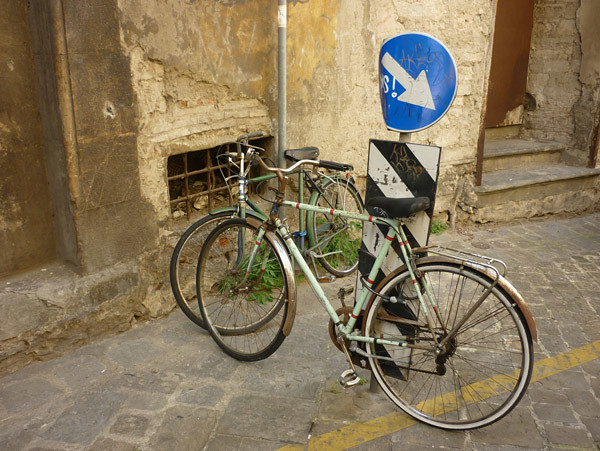
Or sharing rides…
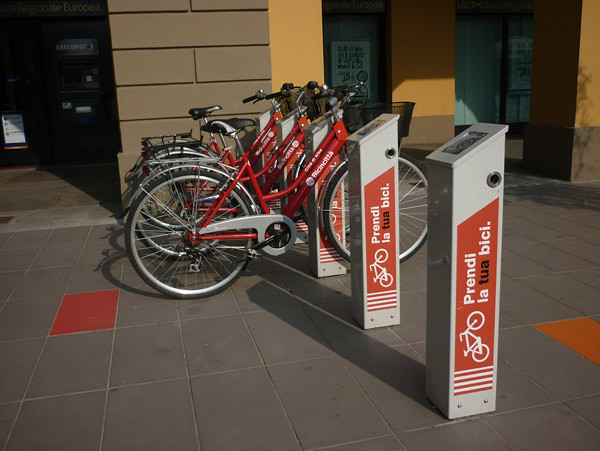
Or stopping in random places to find beauty and marvel at the mundane…

One thing’s for sure. If we want to move beyond talking about a green economy…
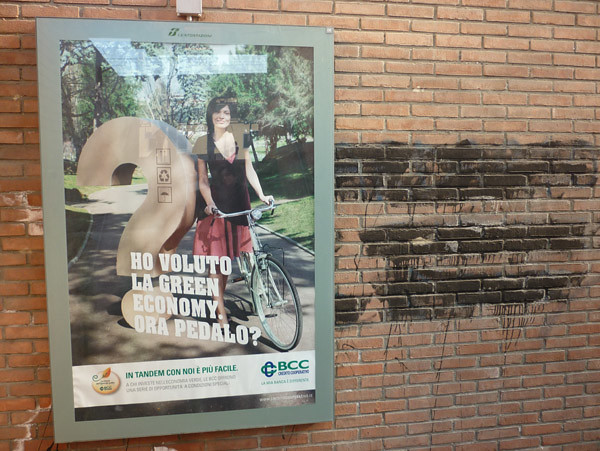
…we have to build cities and infrastructures that support cycling not as a radical act for a few daredevils but as a common means of transportation. Can we shift the way we live, breathe and move as if normal is the new green? I think we can, but we’ve got to de-clutter our minds, slow the pace, and rediscover the power and joy of simplicity.
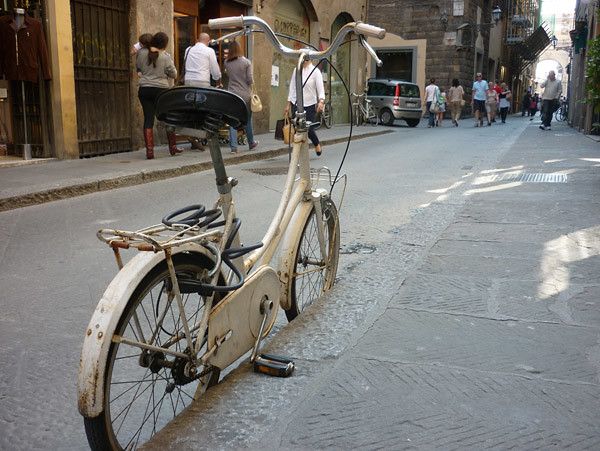
o~O~o~O~o~O~o~O~o~O~o~O~o~O~o~O~o~O~o
crossposted at A World of Words



Sorry, the comment form is closed at this time.